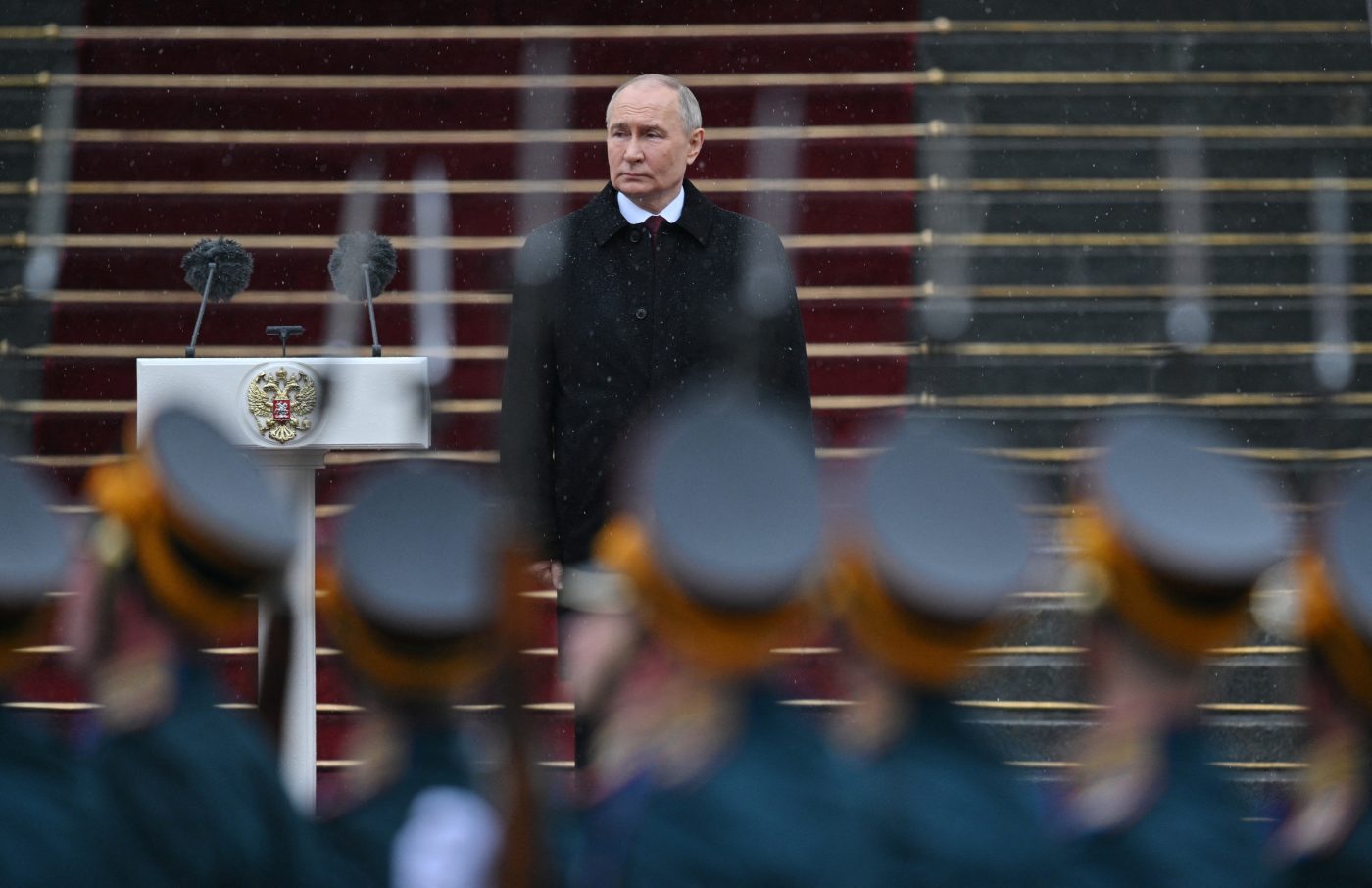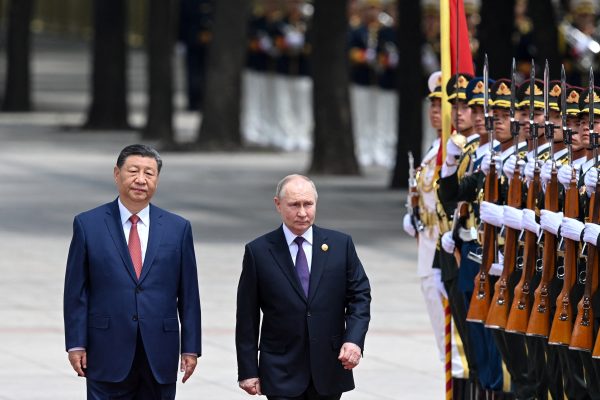No one has done more to undermine Russia’s territorial integrity — indeed, its viability as a state— than the man who clearly intends to rule it until the end of his natural life.
It is bad enough that Vladimir Putin, who swore himself in on May 7. for a fifth term as Russia’s president, has made conflict and conquest the cornerstone of his political legitimacy. In that, alas, he is no different from countless despots and warmongers around the world and throughout history. Putin’s greater crime against the country he purports to serve lies in his attempt to make conquest the mission of the Russian state itself.
By enshrining first Crimea, and then four other pieces of Ukrainian territory as constitutionally sanctified national territory, Putin has tethered the very foundation of the Russian state to a lie. Maintaining that lie — now, and for as long as Russia lays claim to foreign territory — justifies and even necessitates ever-escalating repression at home, and conflict and isolation abroad. While that tether remains in place, then, Russia has no democratic future. Yet any attempt to cut it may simultaneously sever the ties that hold together the Russian Federation itself.
It is exactly that threat of disintegration that Putin — like Josef Stalin before him — is counting on to cement his legacy. He knows anyone who succeeds him will face a stark choice: either accept the lie, and with it the inevitability of autocracy and war, or tear it down – and with it, the Russian constitution and, likely, Russia itself.
For many, including much of Russia’s largely exiled democratic opposition, there are reasons beyond the territorial question to abrogate Russia’s 1993 constitution and begin again. Indeed, the late opposition leader Alexey Navalny proposed replacing Russia’s super-presidential system with a parliamentary one, necessitating an entirely new constitution.
If Putin is succeeded by some faction of the current ruling elite — a far likelier scenario than the ascent to power of Navalny’s followers — their ability to seek rapprochement with the West (if they are so inclined) will also be limited by their fear of undermining Russia’s overall territorial integrity.
All of this begs the question: Should anyone, other than Putin and his acolytes, care whether Russia itself survives?
The unmasking of Russian imperialism brought into clear focus by the full-scale invasion of Ukraine in 2022 has led to the emergence of a plethora of anti-colonial movements within Russia itself. From the North Caucasus to the high north, from the Volga to Vladivostok, non-Slavic Russians have drawn increasing attention to the depredations they, too, have faced at the hands of Moscow, from genocide and forced migration to the near eradication of language and culture. Their moral claim to the right of self-determination is difficult to deny.
It is also difficult to ask Russia’s long-suffering minorities to be patient. Just as Ukrainians, Georgians, and others cannot be expected to take the peacefulness of a post-Putin Russia on faith, neither can Russia’s internal colonies be expected to believe that a country that has never treated them as equals will, simply by virtue of a change of leadership or even constitution, all of a sudden change its stripes. Indeed, the failure of Russia’s democratic opposition to tackle these issues head-on continues to alienate many minority communities.
The disintegration of Russia along ethnic lines, however, would not be simple. For one thing, people who identify as ethnically Russian make up 78% of the country’s population and are the majority in 70 of its 83 internationally recognized regions — including half of the ethnic republics and regions nominally ascribed to minority ethnic groups. To be sure, identity is malleable, and as anti-imperial sentiment rises, some people will feel more comfortable opening up about their non-Russian roots. It is unlikely, however, that this kind of shift would more than marginally impact the demographic balance.
Moreover, while the Soviet Union was primed for disintegration — indeed, it was structurally predisposed to disintegration — today’s Russia is not. The constituent republics of the USSR, apart from being dominated by their titular ethnicity, had functioning bureaucracies, largely self-contained economic infrastructures, and firmly ensconced local political elites, held together predominantly by the coordinating power of the Communist Party and fear of the KGB. Today’s Russia is held together by much more than Putinism, United Russia, and the FSB: Russia’s regions are largely not self-sustainable, and local political elites are weak and broadly illegitimate.
And then there’s the question of memory. For roughly three-quarters of the Russian population, the breakup of the USSR and the decade of poverty and criminality that followed is a living memory. Even for those unhappy with rule from Moscow — and most Russians of any ethnicity outside the capital understand just how extractive the Kremlin is — the prospect of a second period of socio-economic upheaval is not a happy one.
As strong as the centrifugal forces are likely to be when Putin leaves office, then, the centripetal forces are likely to be just as strong, if not stronger. As the battle lines are drawn and uncertainty reigns, Western governments may be tempted, and will certainly be urged, to take sides.
Some, fearing the loss of control over Russia’s nuclear arsenal, as well as the potential for inter-ethnic warfare across 11 time zones, will call for the West to tip the scales in favor of Moscow. Others, perhaps recalling George H.W. Bush’s infamous “Chicken Kyiv” speech, will want to seize the opportunity to put an end to Russian imperialism once and for all.
Washington and its allies should resist this temptation, for at least three reasons.
First, absent direct military involvement, the ability of the West to affect the outcome of such a large and complex political process will be minimal, while the potential to deepen animosities and deprive itself of leverage will be immense.
Second, the West itself is likely to be divided over how and whether to intervene, precisely at a time when maintaining transatlantic solidarity in the face of uncertainty will be of paramount importance.
And third, trying to shape the future of Russia — likely in vain, and likely at great cost — will only distract the West from focusing on the critical issues over which it has genuine leverage, such as providing security for Ukraine, and pushing ahead on the next round of European Union enlargement.
In fact, for as long as the war in Ukraine continues, the conversation about whether Russia can and should survive in its current form is a harmful distraction. For those who fear Russia’s disintegration, an unlikely event in any circumstance, it creates an unreasonable reticence to support Ukraine.
For those who would welcome Russia’s demise, it engenders a kind of magical thinking, as though the war might more easily be won in Russia than in Ukraine. Either approach costs lives.
Sam Greene is Director of the Democratic Resilience Program at the Center for European Policy Analysis and Professor of Russian Politics at King’s College London.
Europe’s Edge is CEPA’s online journal covering critical topics on the foreign policy docket across Europe and North America. All opinions are those of the author and do not necessarily represent the position or views of the institutions they represent or the Center for European Policy Analysis.





